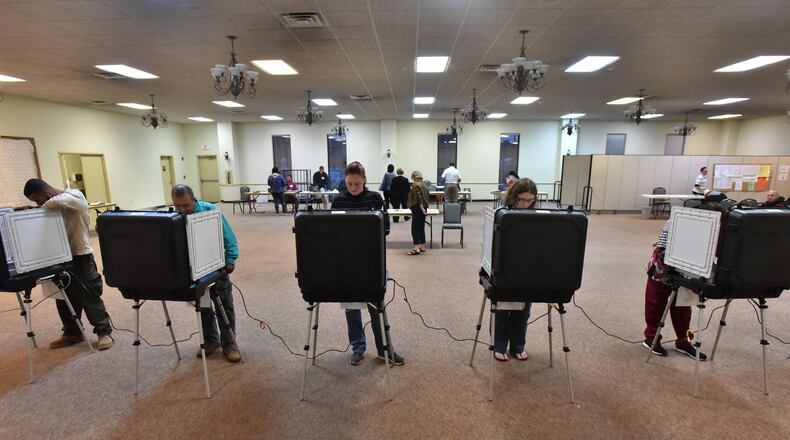Nearly one in 10 vote-by-mail ballots have been rejected by Gwinnett County election officials, alarming voting rights groups.
Gwinnett is throwing out far more absentee ballots than any other county in Georgia, according to records from the Secretary of State’s Office. Ballots were discarded because of allegedly mismatched signatures, incomplete forms or missing residential addresses.
The county rejected 390 absentee ballots through Sunday, which represents 8.5 percent of all mailed ballots received in Gwinnett so far, according to state figures. Across Georgia, less than 2 percent of absentee ballots have been rejected. Gwinnett accounts for about 37 percent of all rejected ballots in Georgia.
“They’re putting an extra burden on someone to come back in to get another absentee ballot. That’s unheard of,” said Helen Butler, executive director for the Coalition for the Peoples’ Agenda, a civil rights group.
Gwinnett officials didn’t have an explanation for the disproportionate number of rejected absentee ballots — but also denied any wrongdoing.
“I can’t draw any conclusions,” said county spokesman Joe Sorenson on Monday. “I just know that we’re doing this according to state law.”
Absentee voters whose ballots are rejected are notified by mail or email and told how to resubmit their ballot, or vote in person.
Across the state, voting by mail has doubled so far this election year compared to midterm elections four years ago. The increase in absentee-by-mail voting is an early sign of increased turnout and high levels of interest in the race for governor between Democrat Stacey Abrams and Republican Brian Kemp.
In-person early voting began statewide Monday and continues until Nov. 2.
Problems with rejected ballots are a “red flag” for racial minorities in Gwinnett, where more than 60 percent of residents are Latino, black or Asian, said Jerry Gonzalez, executive director for the Georgia Association of Latino Elected Officials. It wasn’t clear Monday exactly how many of the rejected ballots came from voters who are minorities.
Because of its sizable Latino population, Gwinnett is the only county in Georgia that is federally mandated to provide elections materials in both English and Spanish. The primary election in May was the first time such materials, which include registration forms, ballots and everything in between, were used.
“Gwinnett County needs oversight to ensure it does not disproportionately disenfranchise minority voters this election cycle,” Gonzalez said.
Gwinnett Elections Board Chairman Stephen Day called the county’s rejection rates “unsettling,” but he balked at any suggestion that they may be the result of any intentional wrongdoing or malice.
“Whatever those reasons are (behind the significant rate of rejections), I repeat they do not appear to me to be rooted in some nefarious scheme by the local Gwinnett County Election Division staff to suppress any type of voter from voting,” said Day, a Democratic Party appointee to the Gwinnett Elections Board.
Each county elections office decides how to process its absentee ballots, and voters with questions can contact the Georgia Secretary of State’s Office, said spokeswoman Candice Broce.
Roula AbiSamra of the National Asian Pacific American Women’s Forum said the rejections appear to be affecting minority voters disproportionately.
“It seems like discrimination,” AbiSamra said. “We’re worried that people who already go through so many hoops to get their documentation in line are going to suffer again, even though they’re doing everything they can to follow the system.”
The most frequent reason election officials rejected absentee ballots was for “insufficient oath information,” which is where voters fill out their signatures, birth dates and addresses on the envelope used to mail their ballot. Election officials also discarded ballots if they were missing a voters’ birth year, or if voters listed the current year as their birth year.
“If this was a systemic issue, you would think that it would be affecting other counties,” said Michael McDonald, a University of Florida political scientist who runs the United States Elections Project, which provides data about elections across the country.
The issue of ballot rejections in Gwinnett came after news last week that more than 53,000 Georgia voter registrations are on hold because of discrepancies between registration applications and government records. Under the state's "exact match" law, registration applications can be put in pending status even for small inconsistencies, such as a missing hyphen in a last name or a typo.
Potential voters whose registrations are pending can still cast ballots if they verify their information with a state driver’s license or other form of photo ID. Election officials will accept verifications when citizens go to vote or beforehand.
Several groups sued the state over the "exact match" law last week, including the Coalition for the Peoples' Agenda. The lawsuit alleges the law disproportionately harms minority groups, and it demands that pending voters become active voters.
If you encounter problems when voting, we’d like to hear your tips. Text a text message with the word “VOTE” or “VOTA” (for Spanish language) to 81380 to report issues.
Keep Reading
The Latest
Featured






